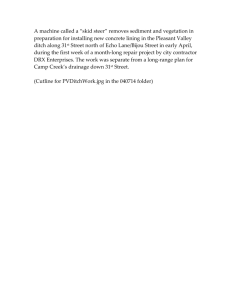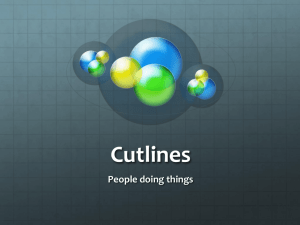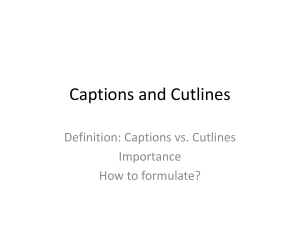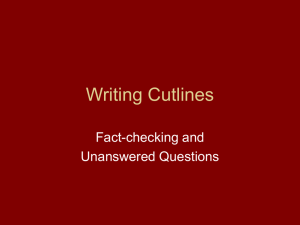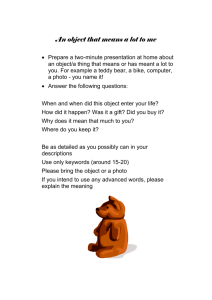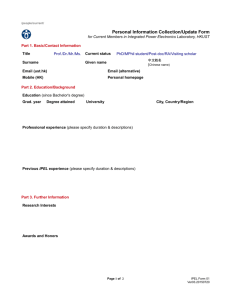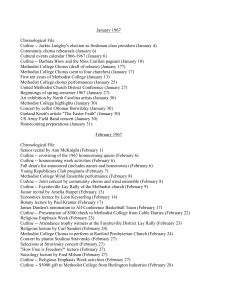20 Tips for Writing Captions
advertisement
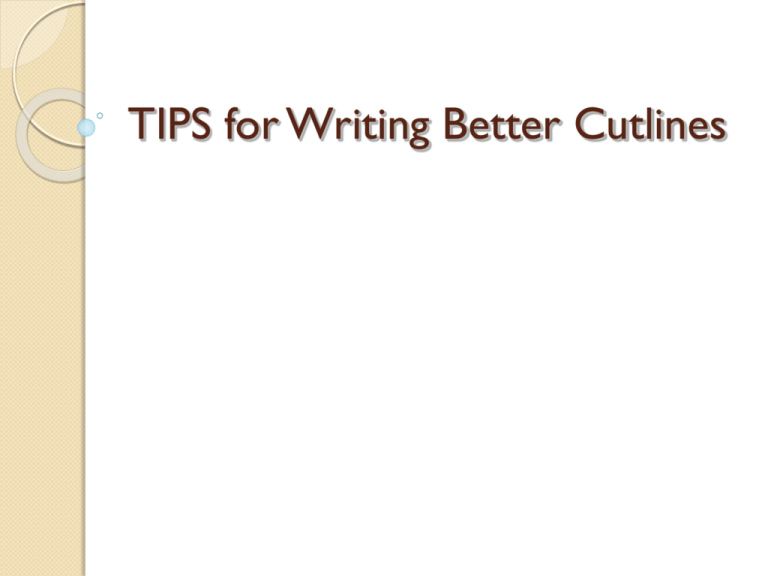
TIPS for Writing Better Cutlines What’s a good cutline? A good cutline conveys action, context and meaning. It answers obvious questions. It should not repeat too much of the story or headline. It should follow style, grammar rules. Who cares? Cutlines get higher readership than story text. Cutline may determine whether a story is read. Photos make an impression. A good cutline satisfies reader curiosity, adds value. Think of a cutline like a movie trailer – a compelling preview. Don’t insult the reader Don’t say: Barack Obama smiles as he bowls a game in Pennsylvania. Don’t say: The farmer stands next to the fence. Your readers know the obvious. Tell them more – why is Obama bowling? What is the farmer growing? Think mini-stories. True especially with a standalone photo. Make sure you answer the basics – who, what, when, where, why and how. You don’t have much space but neither does a 30-second TV story. Tell us who is who Do it simply. Sue Bullard, left,…. Or Jerry Jones, wearing red, …. Avoid these Is shown Looking on Old photos + dates Charlton Heston in this 1967 photo Don’t belabor the obvious Don’t say Hillary Clinton, left. We all know what she looks like. Use present tense Use present tense for 1st sentence. The picture freezes the moment so present tense creates a sense of immediacy. Lincoln Fire Chief Tom Brown carries 3year-old Tina Wilson out of her burning home. Tina's parents, Al and Barb Wilson, died from smoke inhalation Friday when fire destroyed their home. Use the right tone Don’t be funny if the picture isn’t. Identify the main people Always identify the key figures in a photo. Photos record history. Don’t leave part of the history blank. People like to see their names in print. Look for identifiers You may need to say John Jones, in red, rather than far right if that more easily identifies him. Starting out Avoid using a name at the beginning unless it’s a well known person. Choose your words carefully – avoid a delayed lead. Use commas George Bullard, lower left, Be conversational Be accurate Verify everything. Check for consistency. Double-check names. Don’t assume the photographer’s spelling is right. Spell-check. Don’t make judgments Never assume anything. Is the man really asleep in the park? Is he dead? Is he praying? Ask questions Be as specific as possible. The more specific you are, the easier it is to understand the story. The 100-year-old train station, instead of the old station. Use language that adds to the photograph. Use active verbs Avoid puns, cliches You are the editor Photo illustrates a story about the collapse of a stretch of elevated freeway. In the foreground are 2 women who are disturbed by the sight. In the background is the wreckage and assorted police and fire personnel. Is this a good cutline? Joline Smith and Mary Jones react in shock and sadness at the sight of the Nimitz Freeway collapse yesterday. Situation 2 Photo shows crowd at 1st game of season for local major league baseball team. In the foreground, is youngster wearing a logo jacket and carrying a banner. He’s in the upper deck. In the background is a panorama of the stadium. Is this a good cutline? This young fan came to Opening Day to fly the flag and root, root, root for the home team. Situation 3 Photo shows a Latino man in back of police car. He is looking straight at the camera and appears to be very angry. Is this a good cutline? Forgery suspect Jorge-Luis Ortega snarls at the camera after police arrest him at his Hayward home.
